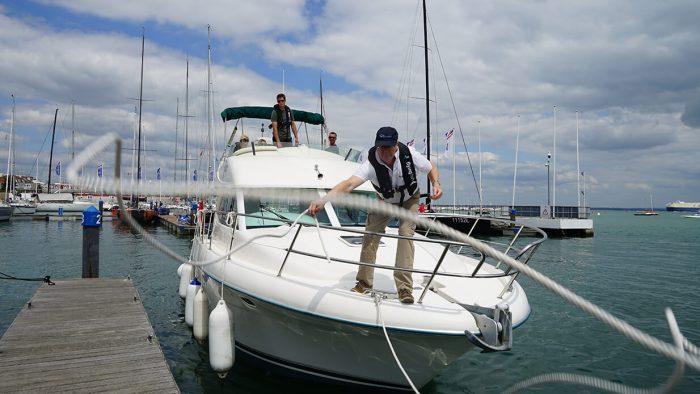This intensive course covers everything you need to become a capable Yachtmaster. Our most successful students don’t just turn up and hope for the best – they come prepared.
Customer feedback consistently tells us the same thing: “I wish I’d revised more before starting.” By doing some background reading beforehand, you’ll give your instructors more time to focus on the advanced practical and navigational skills that’ll set you apart.
Below are the five essential topics, and a reading list at the end of this article, that’ll give you a solid head start on your course.
5 topics to learn before your Yachtmaster Course and exam
1. I.R.P.C.S.
The International Regulations for Prevention of Collisions at Sea aren’t just guidelines, they’re your lifeline at sea. As a Yachtmaster, you must know these rules inside and out.
There’s an IRPCS test during your Yachtmaster Theory Course with a 70% pass mark, plus detailed questions during your practical exam. Therefore you need to learn your IRPCS.
Topics to focus on:
- General Rules (1–3)
- Steering and Sailing Rules (4–18)
- Lights and Day Shapes (20–31) – flip cards are brilliant for learning these
- Sound Signals for good and restricted visibility (32–37)
- Distress Signals (Annex IV)
Free resource: Get the official wording from Merchant Shipping Notice MSN 1781, it’s completely free and based on the real regulations.
You don’t need to memorise every word, just develop a solid, working understanding that you can apply in real situations.
2. Meteorology
Understanding meteorology isn’t just useful, it’s essential for safety and confidence. Use this link here for our resource about weather.
Master these weather fundamentals:
- Terminology and the Beaufort scale
- High and low-pressure systems and wind flow around isobars
- Wind direction and air properties
- Passage of a frontal depression
- Weather fronts and their associated clouds
- Sea breeze formation
- Advection and radiation fog
3. Diesel Engine Knowledge
As a Yachtmaster (the person in charge) you are expected to understand how a diesel engine works onboard your vessel. Don’t worry if you’re not mechanically minded, the RYA Diesel Engine Maintenance Handbook is perfect to help you understand the basics.
Essential engine knowledge:
- How diesel engines actually work
- Cooling systems and common faults that could leave you stranded
- Fuel systems and why clean fuel is absolutely critical
- Changing fuel filters when they get blocked
- Bleeding the fuel system
- Understand turbochargers vs supercharging
- 12V electrical systems, starter motors, and alternators
Remember: You won’t become a marine engineer overnight, but understanding these basics shows you’re serious about seamanship.
4. Radar
If you can get your hands on a radar set, spend time playing with the basic features.
You need to be familiar with Rule 19 of the IRPCS – Conduct of vessels in restricted visibility.
5. Chart Symbols
The examiner expects you to understand your chart symbols.
As a starting point, please memorise the common chart symbols from our provided PDF.
Get your paperwork sorted!
Before you arrive for your Yachtamster Offshore Course and exam, make sure you have:
- All prerequisite sea miles logged and verified
- Valid VHF certificate
- Current First Aid certificate
Not sure about sea time requirements? Check the prerequisites – it’s better to be certain now than disappointed later!
Important: You’ll complete an RYA application form detailing your sea time and certificates, plus pay the £231 exam fee directly to the RYA.
What’s the Yachtmaster Exam actually like?
You’ll take the helm of our motorboat while the examiner observes how you organise, navigate and handle the vessel.
Like your driving test, the RYA Yachtmaster exam puts you in the driving seat, with the examiner onboard to see how you organise, navigate and handle our motorboat. You will “take charge” of the motorboat for short periods and asks to perform tasks set by the examiner during the day and night.
Exam structure:
- Around 12 hours for one candidate
- Up to two days for groups of four
- Mix of practical and theoretical exercises
- Both day and night assessment
- You won’t be helming the entire time, but everyone gets assessed on everything
What does the Examiner want to see?
The RYA examiner has one crucial question: “Is this candidate safe to go to sea?” and each examiner has his or her own methods of finding the answer to that critical question.
But generally they’re assessing:
- Your knowledge and practical skills
- Leadership and communication abilities
- Your attitude towards safety and seamanship
- Whether you’d make decisions that keep everyone safe
Here’s the great news: All examiners want you to succeed. Nobody enjoys failing candidates, and over 95% of Flying Fish students pass their exam. Those are odds we’re proud of.
What if things don’t go to plan?
Failing usually comes down to an accumulation of small errors that create doubt in the examiner’s mind. It happens and if it does, we can arrange a resit for another date. No drama, just another opportunity to succeed.
The RYA examiner uses a detailed practical report form covering all assessment areas. We cover every single topic during our comprehensive two-week Yachtmaster Theory and Exam course.
By doing your background reading now, you’ll spend less time on basic theory and more time mastering the core practical skills that make the difference between a good sailor and a great Yachtmaster.
Your full Yachtmaster Offshore exam reading list
We’ve handpicked these resources to give you the best possible preparation:
1. Collision Regulations (IRPCS)
IRPCS Regulations for Collision at Sea (RYA eBook)
🔗 https://www.rya.org.uk/shop/p/rya-collision-regulations-ebook
Flip Cards – Lights & Shapes
🔗 https://flipcards.co.uk/product/lights-and-shapes/
Sound Signals (PDF)
🔗 https://www.flyingfishonline.com/app/uploads/2023/04/IRPCS-sound-signals-for-Yachtmaster-exam.pdf
Distress Signals (PDF)
🔗 https://www.flyingfishonline.com/app/uploads/2023/04/Distress-signals.pdf
Merchant Shipping Notice MSN 1781 (Official COLREGs)
🔗 https://www.flyingfishonline.com/app/uploads/2023/04/msn1781.pdf
2. Weather & Meteorology
Weather Terminology (Flying Fish PDF)
🔗 https://www.flyingfishonline.com/app/uploads/2023/04/Weather-terminology.pdf
RYA Weather Handbook (eBook)
🔗 https://www.rya.org.uk/shop/p/rya-weather-handbook-ebook
3. Engines & Systems
RYA Diesel Engine Maintenance Handbook (eBook)
🔗 https://www.rya.org.uk/shop/p/rya-diesel-engine-handbook-ebook
4. Charts & Navigation
Chart Symbols & Abbreviations (PDF)
🔗 https://www.flyingfishonline.com/app/uploads/2023/04/Chart-symbols-and-abreviations.pdf
Reeds Skipper’s Handbook (Amazon)
🔗 https://www.amazon.co.uk/Reeds-Skippers-Handbook-Sail-Power/dp/1472972163
5. Exam Paperwork & Preparation
Yachtmaster Offshore Exam Prerequisites
🔗 https://www.flyingfishonline.com/rya-yachtmaster/requirements-for-yachtmaster-offshore-exam/
RYA Exam Application Form (PDF)
🔗 https://www.flyingfishonline.com/app/uploads/2023/04/RYA-Exam-application-form.pdf
How to Pass Yachtmaster Power (Flying Fish article)
🔗 https://www.flyingfishonline.com/news/how-to-pass-yachtmaster-power/
Examiner Report Form (PDF)
🔗 https://www.flyingfishonline.com/app/uploads/2023/04/exam-report.pdf





